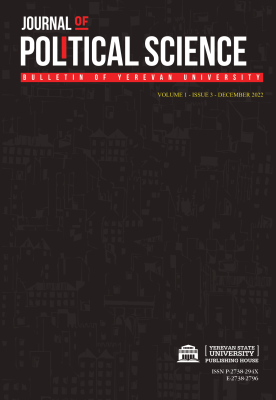Drivers of Fiscal Resources at the Local Level in Russia: Role of Institutions Reflected in Regional Debt
DOI:
https://doi.org/10.46991/JOPS/2022.1.3.060Keywords:
intergovernmental relations, fiscal institutions, local fiscal decentralization, debt sustainability, ordinary least squares, RussiaAbstract
The paper seeks to clarify the consequences of fiscal institutions and centralization of intergovernmental relations in Russia related to regional debt sustainability and intraregional fiscal decentralization. The consolidated regional debt is considered to be the indicator that incorporates various features of institutional framework of the Russian budgetary system, while local fiscal decentralization reflects the number of fiscal resources at the local level. The relationship between governmental debt sustainability and fiscal decentralization is known to be a complex phenomenon. Yet under the analytical framework of this research, I show that the decrease of intraregional fiscal decentralization in Russia is attributable to the growing regional debt. Essentially, I conclude that centralization of intergovernmental relations in Russia leaves little room for maneuver for regional authorities and lead both to growing risk of debt sustainability and shrinking number of fiscal resources at the local level.
It is found that more prosperous Russian regions exhibit higher fiscal decentralization. This finding reinforces the established theory. However, in the rich northern regions of Russia dependent on oil, gas and other commodities the decentralization is relatively high, so some theoretical predictions seem to be misleading. Those unobserved factors remain to be investigated.
Further research agenda consists of conducting calculations based not just on pooled but panel data. It will help considering characteristics of each region. Furthermore, the results need to be reassessed for different indicators of fiscal decentralization.
References
Alexeev, Michael. et al. 2019. “Fiscal Decentralization, Budget Discipline, and Local Finance Reform in Russia’s Regions”. Public Finance Review 47(4): 679–717.
Alexeev, Michael, and Arsenij Mamedov. 2017. “Factors determining intra-regional fiscal decentralization in Russia and the US”. Russian Journal of Economics 3(4): 425–444. doi: 10.1016/j.ruje.2017.12.007
Panizza, Ugo. 1999. “On the determinants of fiscal centralization: Theory and evidence”. Journal of Public Economics 74(1): 97–139. https://doi.org/10.1016/S0047-2727(99)00020-1
Libman, Alexander. 2010. “Empiricheskie issledovaniya faktorov decentralizacii: obzor literatury [Empirical study of the factors of decentralization: a review of the literature]”. Zhurnal Novoj ekonomicheskoj associacii [Journal of New Economic Association], 6: 10-29. (In Russian).
Arzaghi, Mohammad, and J. Vernon Henderson. 2005. “Why countries are fiscally decentralizing”. Journal of Public Economics 89(7): 1157–1189. https://doi.org/10.1016/j.jpubeco.2003.10.009
Boffa, Federico, Amedeo Piolatto, and Giacomo A. M. Ponzetto. 2016. “Political Centralization and Government Accountability”. The Quarterly Journal of Economics 131(1): 381–422. http://dx.doi.org/10.1093/qje/qjv035
Bahl, Roy W., and Sebastian Nath. 1986. “Public Expenditure Decentralization in Developing Countries”. Environment and Planning C: Government and Policy 4(4): 405–418. https://doi.org/10.1068/c040405
Baker, Samuel H. 2000. “Does enhanced veto authority centralize government?” Public Choice 104: 63–79. https://doi.org/https://doi.org/10.1023/A:1005119311685
Frejnkman, Lev, and Alexander Plekhanov. 2008. “Decentralizaciya byudzhetnoj sistemy v regionah-rentopoluchatelyah [Decentralization of the budget system in the regions-rent recipients]”. Ekonomicheskaya politika 1: 103–123. (In Russian).
Harguindéguy, Jean-Baptiste Paul, Alistair Cole, and Romain Pasquier. 2019. “The variety of decentralization indexes: A review of the literature”. Regional and Federal Studies doi: 10.1080/13597566.2019.1566126.
Adam, Antonis, Delis D. Manthos, and Kammas Pantelis. 2014. “Fiscal decentralization and public sector efficiency: Evidence from OECD countries”. Economics of Governance 15(1): 17–49. doi: 10.1007/s10101-013-0131-4
Stegarescu, Dan. 2005. “Public sector decentralisation: Measurement concepts and recent international trends”. Fiscal Studies 26(3): 301–333. doi: 10.1111/j.1475-5890.2005.00014.x.
Ligthart, Jenny E., and Peter van Oudheusden. 2017. “The Fiscal Decentralisation and Economic Growth Nexus Revisited”. Fiscal Studies 38(1): 141–171. doi: 10.1111/1475-5890.12099.
Zemlyansky, Dmitry, and Darina Medvednikova. 2021. “Municipal'nyj dolg krupnyh gorodskih okrugov Rossii v 2015–2020 godah [Municipal debt of large urban districts of Russia in 2015-2020]”. Socio-economic geography: history, theory, methods, practice 2021. Collection of scientific articles of the VII All-Russian Scientific Conference with international participation. Smolensk. 540: 284-295. (In Russian).
Delgado, Francisco J. 2021. “On the Determinants of Fiscal Decentralization: Evidence from the EU”. Amfiteatru Economic 23(56): 206–220. https://doi.org/10.24818/EA/2021/56/206
Downloads
Published
Issue
Section
License
Copyright (c) 2022 Evgeny Timushev

This work is licensed under a Creative Commons Attribution-NonCommercial 4.0 International License.



